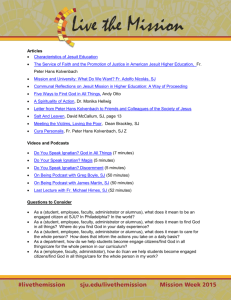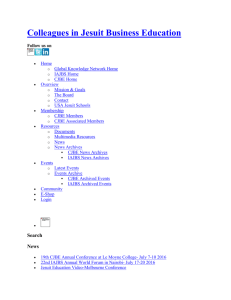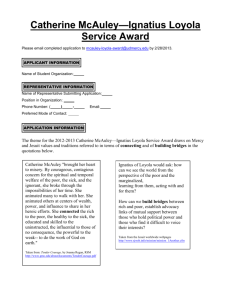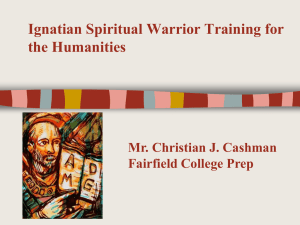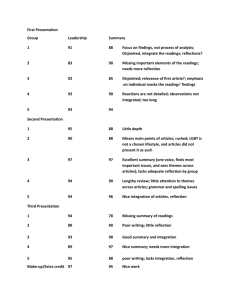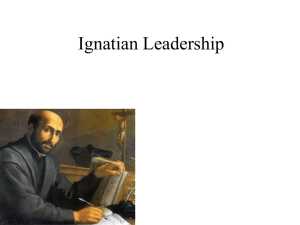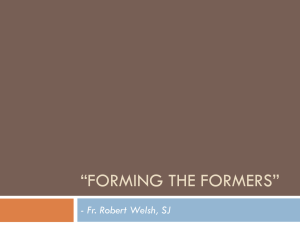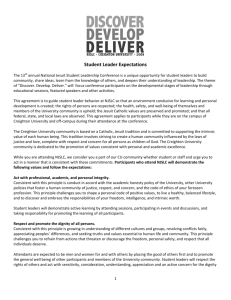UNIVERSITY OF MASSACHUSETTS
advertisement
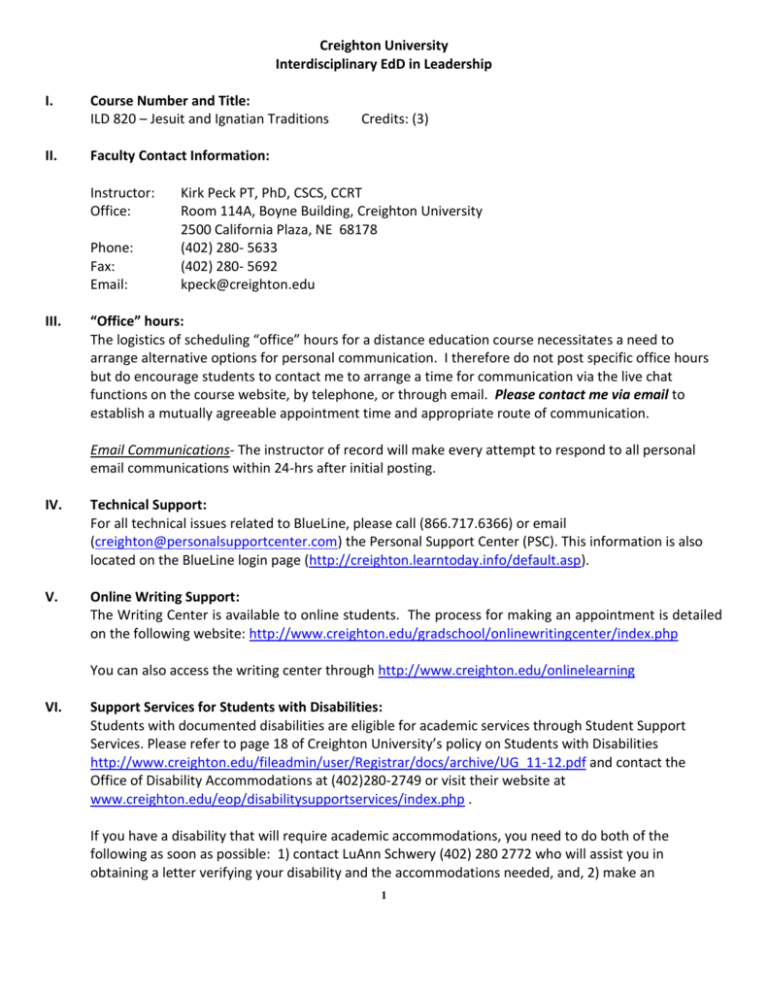
Creighton University Interdisciplinary EdD in Leadership I. II. Course Number and Title: ILD 820 – Jesuit and Ignatian Traditions Faculty Contact Information: Instructor: Office: Phone: Fax: Email: III. Credits: (3) Kirk Peck PT, PhD, CSCS, CCRT Room 114A, Boyne Building, Creighton University 2500 California Plaza, NE 68178 (402) 280- 5633 (402) 280- 5692 kpeck@creighton.edu “Office” hours: The logistics of scheduling “office” hours for a distance education course necessitates a need to arrange alternative options for personal communication. I therefore do not post specific office hours but do encourage students to contact me to arrange a time for communication via the live chat functions on the course website, by telephone, or through email. Please contact me via email to establish a mutually agreeable appointment time and appropriate route of communication. Email Communications- The instructor of record will make every attempt to respond to all personal email communications within 24-hrs after initial posting. IV. Technical Support: For all technical issues related to BlueLine, please call (866.717.6366) or email (creighton@personalsupportcenter.com) the Personal Support Center (PSC). This information is also located on the BlueLine login page (http://creighton.learntoday.info/default.asp). V. Online Writing Support: The Writing Center is available to online students. The process for making an appointment is detailed on the following website: http://www.creighton.edu/gradschool/onlinewritingcenter/index.php You can also access the writing center through http://www.creighton.edu/onlinelearning VI. Support Services for Students with Disabilities: Students with documented disabilities are eligible for academic services through Student Support Services. Please refer to page 18 of Creighton University’s policy on Students with Disabilities http://www.creighton.edu/fileadmin/user/Registrar/docs/archive/UG_11-12.pdf and contact the Office of Disability Accommodations at (402)280-2749 or visit their website at www.creighton.edu/eop/disabilitysupportservices/index.php . If you have a disability that will require academic accommodations, you need to do both of the following as soon as possible: 1) contact LuAnn Schwery (402) 280 2772 who will assist you in obtaining a letter verifying your disability and the accommodations needed, and, 2) make an 1 appointment with your instructor to review this letter and discuss what reasonable accommodations can be made. VII. Course Rationale: This is an elective course offered as part of the curriculum to stimulate reflection on personal values and attitudes in relation to Jesuit and Ignatian traditions. The purpose of this course is to explore and analyze some of the early historical developments that sparked the beginning of Jesuit educational programs during the 16th century. Students will also discuss and reflect on various aspects of leadership by the Society of Jesus that contributed to the expansion of a highly successful educational enterprise. In addition, course material will encourage the use of critical self-reflection on societal expectations for characteristics and personal behaviors from those serving in leadership roles today. VIII. Relationship to Programmatic Themes: A. Jesuit values/mission: The story of Ignatius Loyola and the founding of the Society of Jesus established the essence of longstanding Jesuit traditions that have stood the test of time. The organization of formal educational schools in early Jesuit history enabled the Society to translate their mission to “help souls” by fostering the intellect and instilling a sense of service to others. Ignatius gifted humanity by expressing his spiritual understanding of God’s relationship with humanity in a little book known as “The Spiritual Exercises”. In essence this course is a direct reflection of Jesuit values and mission. B. Interdisciplinary: The inherent nature of understanding various facets of Jesuit and Ignatian traditions is a natural conduit for interdisciplinary integration and collaboration in the working community. Quality leaders will recognize self talents and limitations, and be able to competently identify the value of others in their capacity to serve for the collective good. This ability does not come without genuine selfreflection on personal values, beliefs, morals, and general attitudes towards humanity. By communicating across and within disciplines, the art of effective leadership will be fostered by a greater understanding of human nature and reality. IX. Course Description: Jesuit education stems from philosophical values rooted in the humanistic tradition of Renaissance culture. This course will explore the historical backdrop that sparked the formation of organized Jesuit schools, including the unique style of social leadership that has sustained the Ignatian tradition for over 450 years. To enhance learning, students will engage in critical self-reflection on personal values, attitudes, ethics, and moral development in relation to societal expectations and norms. X. Course Objectives: On completing the course, the students will be able to: 1. Identify and discuss significant events that contributed to the life of Ignatius Loyola and origins of the Society of Jesus. (Program Objective 1) 2. Articulate key historical social and political events that shaped the early development of Jesuit schools in the 16th century. (Program Objective 1) 3. Assess important leadership characteristics that helped foster and sustain a 450 year old system of worldwide education grounded in the Jesuit tradition. (Program Objectives 1, 4) 2 4. Reflect on self-leadership style in relation to Ignatian-based values, behaviors, morals, and attitudes; then compare and contrast how those attributes contribute to effective practice in the workforce. (Program Objectives 1, 2) 5. Discuss, reflect, and implement personal strategies to incorporate Ignatian values into daily activities, interactions with others, and work related functions. (Program Objectives 1, 2, 6) 6. Critically review current evidence-based research related to fostering, integrating, and assessing Ignatian-based values in personal and work related environments, and to identify relevant implications. (Program Objectives 2, 10) XI. Teaching and Learning Methods: XII. Critical Reading – Focused reading assignments have been selected for class dialogue and personal reflection to emphasize important principles embedded in this course. Required readings are outlined in the course schedule. Reflective Writing - Written assignments are structured to facilitate critical self-reflection in relation to personal context and life application. Interdisciplinary Dialog - Structured on-line forums will be used to foster dialog between and among students and to share new ideas and concepts related to behaviors, attitudes, and moral dilemmas. Literature Critique - Exploration and critique of evidence-based research will be used to analyze the utility of incorporating Ignatian values in personal life, interaction with others, and work environment. Feedback - Students will receive both summative and formative feedback based on their progress in the course. Grading (overall course and individual assignments): Every effort will be made to grade the project and peer reviewed posts within 5-7 days of submission due dates. It is important that your contributions to the course are thoughtfully reviewed and allowed adequate time to provide constructive feedback. Grade A B C F Grading Criteria (% of total points) 94 – 100% Superior performance in meeting course objectives 86 – 93% Excellent/good performance in meeting course objectives 78 – 85% Average performance in meeting course objectives <78% unsatisfactory performance 3 Assignment Reflection Readings: 300-350 words Week 2 Week 4 Week 6 Week 8 Course Grading Distribution Weight 24% total 6% 6% 6% 6% Weekly Postings/ Discussion Board Personal Strategies Paper (Ignatian Values) Draft “Literature Critique” Peer Review Final Research Project (Peer Review) Total Total Possible Points 240 total 60 60 60 60 16% (2% per week) 10% 160 (20 per week) 100 10% 100 40% 400 100% 1000 PAPER Preparation: All papers are to be prepared following APA (American Psychological Association) guidelines. Papers are to be double-spaced, 1 inch margins, formatted and referenced according to APA guidelines. A quick reference document for the APA style guide is on the course website. Please see separate instruction sheet for a complete description and expectations for the final course project. Assignments ILD 820: SCHEDULE/ ASSIGNMENTS: Week 01 June 25 02 July 2 Topics Introduction to the Course Meet and Greet (Personal Context) Inigo Comes Alive Reflection Readings (1) Origin of Jesuit Education Renaissance Humanism 03 July 9 Ignatian Pedagogical Paradigm and relation to the Spiritual Exercises Reflection Readings (2) Assignments: Readings/Discussion/Written Work * Opening Reflections - Holy Bible: Mark 10: 41- 45 (Christian Leadership) Matthew 20: 24- 28 (Associated Gospel) - O’Malley: First Jesuits. Chap 1: pp. 1- 50 - Byron: Chap 1 * Fleming: Vision, pp 1; God is Love, pp 7 - Traub: The Experience of Ignatius Loyola: Background to Jesuit Education. pp. 63- 86 - O’Malley: First Jesuits: Chap 6: pp. 200 Chap 7: pp. 243 - Byron: Chap 2 - Ignatian Pedagogical Paradigm (document) - Traub: pp. 272- 284 - Byron: Chap 5 * Fleming: Pilgrimage, pp 31; God Calls, pp 37; and God Communicates, pp 43 4 04 July 16 05 July 23 06 July 30 07 Aug 6 08 Aug 13 Leadership Characteristics of Jesuit Education Personal Strategies Paper Self-Leadership Styles Reflection Readings (3) Literature Review & Project Proposals Peer Feedback on Proposals Reflection Readings (4) Peer Review of Final Paper “Optional” but highly recommended - Traub: pp. 108- 112; & 144- 188 - Byron: Chap 4 - Letters of Ignatius * Strategies Paper Assignment - Byron: Chap 6 & Chap 7 * Due: Strategies Paper (By Sunday July 29th, 11:59 p.m. CST) * Fleming: Knowing Jesus, pp 61; Mission of Christ, pp 67; Clarify your values, pp 71 - Project Work Week * Due: Lit Review & Project Proposals (By Aug 5, 11:59 p.m. CST) - Project Submissions For Feedback * Fleming: Discern God’s Will, pp 89; Working with Others, pp 95 - Paper Submissions * Due: Final Paper (By Aug 17, 11:59 p.m. CST) XIII: University Academic Integrity Policies: Be particularly aware of the dangers of plagiarism. We expect that your written products are your own creation. “Copying and pasting” others’ written work through any kind of internet search is a serious offense. If you have questions here, I would be more than happy to discuss them. “Plagiarism” is the attempt to pass off other peoples’ work (ideas, words, phrases or passages) as your own. Plagiarism is not acceptable regardless of which writing style, format, guide or publication manual you may be using to complete an assignment. The penalty for plagiarism can range from a grade of "F" on the assignment, paper or test, to a grade of "F" for the course and/or dismissal from the University. A student who engages in any of the following acts of academic or academic-related misconduct is subject to disciplinary procedures and sanctions as determined by the school or college in which he or she is enrolled. Academic or academic-related misconduct is defined to include but is not limited to: 1. Unauthorized collaboration or use of external information during examinations. 2. Plagiarizing or representing another’s ideas as one’s own. 3. Furnishing false academic information to the University. 4. Falsely obtaining, distributing, using, or receiving test materials. 5. Falsifying academic records. 6. Falsifying clinical reports or otherwise endangering the well-being of patients involved in the teaching process. 7. Misusing academic resources. 8. Defacing or tampering with library materials. 9. Obtaining or gaining unauthorized access to examinations or academic research materials. 10. Soliciting or offering unauthorized academic information or materials. 11. Improperly altering or inducing another to improperly alter any academic record. 12. Engaging in any conduct which is intended or reasonably likely to confer upon one’s self or another unfair advantage or benefit respecting an academic matter. 5 The University Student Handbook can be found at: http://www.creighton.edu/studentservices/centerforstudentintegrity/ XIV. Course Policies: COURSE WEEK – This course is organized to be completed in eight weeks. Each week will begin Monday morning at 12:01 am and will end on Sunday evening at 11:59 pm. INSTRUCTOR EXPECTATIONS – Students are expected to thoroughly read the weekly posted assignments and thoughtfully respond on the discussion board in a timely manner that reflects graduate work in a doctoral program. XV: Prerequisites: None. This course is an elective. XVI: Instructor of Record: Kirk Peck PT, PhD, CSCS, CCRT Room 114A, Boyne Building Creighton University 2500 California Plaza Omaha, NE 68178 Email: kpeck@creighton.edu Phone: 402.280.5633 (Office) Fax: 402. 280. 5692 XVII: Discussion and Writing Requirements. (Instructor reserves the right to modify these as the course proceeds.): Discussion Rationale: Postings on the discussion board are designed to facilitate your development as a reflective individual, both personally and professionally. Class discussion provides an opportunity for students to engage in valuable peer review and feedback on opinions, thoughts, and propositions. They are intended to help strengthen your skills as a scholar and researcher and to build the learning community in this course. Quality of the postings is much more important than quantity. The course instructor will read all posts, but will only comment as needed to contribute meaningfully to the discussion or to clarify important concepts. Because your feedback to others is so vital to the development of their project, it is imperative that you post and provide feedback by the dates assigned. Therefore, late postings will receive a grade of zero unless prior approval to post after the deadline is received from the instructors. (Grades will be posted in the Course Grade book on BlueLine each week.) Posting Guidelines: Review the grading criteria for discussion posts. Examples of criteria are completeness, correctness, clarity, quotations when these are appropriate for the initial post or responses. Generally, keep quotations to a minimum. Emphasize using your own words. 6 Stay within 250-400 words (citations excluded). Cite sources for comments and quotations with abbreviated forms for the text and other assigned readings. Use full citations for other sources (APA format. You will find links to these in the Student Resource Center/Content/Research and Writing Tools/Citation Style Guides.). Provide page numbers for book quotations (e.g. Smith et al, Ch 8, p. 11). Posting Due Dates: Initial: Please post all “initial” weekly discussion responses by 11:59 a.m. Thursday CST. Follow-Up: Respond to at least two of your fellow students' written comments with one or more posts during the week of discussion. End Post: Weekly discussions end at 11:59 p.m. Sunday evening CST. Reflection Readings (Fleming): The four graded reflection readings for this course were selected from a short book by David Fleming SJ entitled, “What Is Ignatian Spirituality?” The assigned reflections are focused on various aspects of Ignatian spirituality that specifically highlight important humanistic values, behaviors, ethics, and attitudes as outlined in ILD 820 course objective #3. The purpose of reflecting on these readings is to facilitate introspection and assessment of values in relation to one’s own leadership style, and to outline personal strategies to integrate the Ignatian values/charisms within personal context. (e.g. See Objective #4, course syllabus). Assignment: Read the assigned reflection chapters from Fleming. Each reading offers a unique perspective on topics related to spirituality, relationships with God, service to others, faith beliefs, etc. As you read the passages ask yourself the following questions … What moved you the most? What was most meaningful to you at this time in your life? Did you agree or disagree with Fleming? After careful reflection write a few paragraphs on how Fleming speaks to your own thoughts about human values, ethics, attitudes, responsibilities, or relationships with others and society. You do not have to comment on every chapter from Fleming but rather just on what struck you the most. If, for example, only one of the two or three assigned chapters sparked your interest then reflect on that particular reading for the paper. This is simply an opportunity for you to explore and express your own beliefs and reactions to another individual’s point of view on spirituality. Reflections will be shared with only the course instructor for a grade. Please keep all reflections within the stated guidelines. Each reflection response is limited to no more than 300-350 words in length (Approx 1 to 1 ½ pages double spaced; 12 point font). Due Dates: Reflection #1 - Sunday, July 1, 11:59 p.m. CST Reflection #2 - Sunday, July 15, 11:59 p.m. CST Reflection #3 - Sunday, July 29, 11:59 p.m. CST Reflection #4 - Sunday, August 12, 11:59 p.m. CST 7 Personal Strategies Paper Assignment: The purpose of the strategies paper is to reflect on your own self-leadership style in relation to Ignatian-based values, behaviors, morals, and attitudes (see course goal #4). Using 12 point font in Times New Roman or Calibri, please type a two page essay (~ “500 words), double spaced paper to include the following: 1) Briefly describe your current personal leadership style; 2) Describe how you might integrate one or more of the Ignatian-based characteristics into your personal behaviors; and 3) Provide one or two examples of how your work environment or job related responsibilities might change based on the characteristics you chose to integrate. Begin: Monday, July 16 Due: On or before Sunday, July 29 at 11:59 p.m. CST Final Paper and Literature Critique: Please see separate assignment sheet for requirements. XVIII: Required Texts & Readings: (see course schedule for outline of weekly reading assignments) 1. Byron, W. (2008). Jesuit Saturdays: Sharing the Ignatian Spirit with Lay Colleagues and Friends. Chicago: Loyola Press. 2. Fleming, D. (2008). What is Ignatian Spirituality. Chicago: Loyola Press. 3. O’Malley, J. (1995). The First Jesuits. Cambridge: Harvard University Press. 4. Traub, G. (2008). A Jesuit Education Reader: Chicago: Loyola Press. Articles: 1. International Center for Jesuit Education. (Rome, 1993). Ignatian Pedagogical Paradigm: A Practical Approach. 2. Selected Letters of Ignatius Loyola. (Posted on-line by course instructor). Optional: 1. The Holy Bible (Version of Preference) 8
